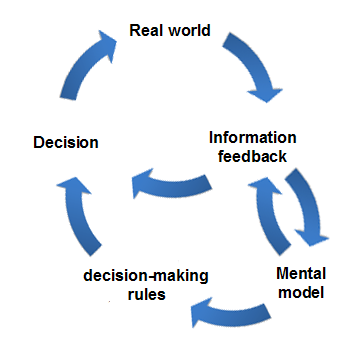Mental Models

What is a Mental Model ?
A Mental model is an insight that you can apply to new situations. For example gravity, you know that if you fall down it is going to hurt, or that pushing something heavy uphill is harder than on flat ground, etc… Popularized by Charlie Munger (investment wizard), as a way to better evaluate situations and make better decisions a.k.a. practical wisdom. It applies to all areas, from human psychology, solving problems, investment, etc..
Charlie Munger summed up the approach to practical wisdom through understanding mental models by saying: “Well, the first rule is that you can’t really know anything if you just remember isolated facts and try and bang ’em back. If the facts don’t hang together on a latticework of theory, you don’t have them in a usable form. You’ve got to have models in your head. And you’ve got to array your experience both vicarious and direct on this latticework of models. You may have noticed students who just try to remember and pound back what is remembered. Well, they fail in school and in life. You’ve got to hang experience on a latticework of models in your head.”
The following serves as a compilation of mental models i came across and want to register, and is potentially a continuous work in progress.
Map is not the territory
- Map = Model
- Models are not perfect, but they don’t need to be perfect to be useful
- Each of the following are mental models / maps
Circle of competence
- Lifer(true mastery) vs Newbie
- True mastery and is aquired throught theoretical, practical, failure, scares, experience over time.
First principles thinking
- Does not simply reuses word of mouth assumptions
- In cases, not knowing (or not caring for) the status quo, forces think trought what it should be, and thus goes closer to first principles thinking, etc.
Thought experiments
- Simulate, what-if situations
2nd order consequences
- Look / simulate what are the 2nd order consequences of your acts.
Grass is always greener on other side
- Part of human nature to always think the other person got it better, sometimes just looking at their current moment and not understanding what they went trought, or what is in fact the reality behind.
Inversion
- https://www.anup.io/2020/07/20/invert-always-invert/
Circles of control
- Realize that only a few things are within a persons control.
- Don’t take a bet on things out of your control, instead set goals on things that are part of your control.
- Control is not necessarily binary, our own actions are fully controllable, other’s actions are not controllable, but they are somewhat influenceable, so there’s the idea of circles of control
Goals
- Not having a goal, translates into random drifting, sometimes you hit good things, sometimes not. Goals (and planing) lets you hit what you are trying to get to more often.
- Goals, planing allows to hit the ground running and getting things done faster
Failure
What is failure? Its really only failure if that is the last thing you do, otherwise is instead a lesson along the way.
